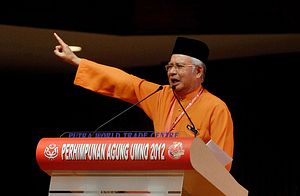On October 12, Malaysia’s Foreign Minister Anifah Aman confirmed to reporters that Malaysia had no plans to have a new ambassador in North Korea following a recall of its chief diplomat earlier this year. Anifah’s remarks, which made for some sensational headlines, are in fact just the latest sign of the Southeast Asian state’s growing series of limited and calibrated restrictions of its links to Pyongyang on some fronts.
As I have noted before, although the broader Malaysia-North Korea relationship has tended to be poorly understood, it is certainly true that recent incidents such as Pyongyang’s battery of missile and nuclear tests; the diplomatic row following the killing of Kim Jong-un’s estranged half-brother Kim Jong-nam at Kuala Lumpur International Airport (KLIA) in February; and the growing scrutiny by U.S. President Donald Trump’s administration on Southeast Asian states’ links with North Korea, had exacerbated tensions in bilateral ties (See: “The Myth of a Malaysia-North Korea Special Relationship”).
Over the past few months, we have seen Malaysia enact some limited and calibrated restrictions against North Korea. Contrary to Trump’s simplistic characterization of this during his summit meeting with Najib as being a one-off declaration of no longer doing business with Pyongyang, the Southeast Asian state’s unveiling of this approach has been more carefully calibrated, with only some of these restrictions in a few areas publicized and at times much later than they were actually implemented (See: “The Real Test for US-Malaysia Relations in the Trump Era”).
So far, restrictions have already been enacted in several realms, including on workers, select businesses, flights, and even postponement of a soccer match, as well as rising concerns about the security of Malaysian citizens evident in the diplomatic row that erupted earlier this year. The latest sign of this was the announcement of a travel ban by Malaysia’s foreign ministry last month. As I wrote at the time, indicators from Malaysian officials suggested that we could see more restrictions of this ilk – and tougher enforcement of existing ones too – being unveiled in the coming months (See: “What’s Behind Malaysia’s North Korea Travel Ban?”).
Sure enough, Anifah confirmed this week what had become increasingly clear: that Malaysia, for now, had no plans to have an ambassador in Pyongyang after it recalled its previous one earlier this year amid tensions with Pyongyang, and that ties would be managed by the embassy in Beijing. Specifically, according to the New Straits Times, Anifah, who was attending an event on Malaysian foreign policy at Universiti Malaysia Sarawak (UNIMAS), said that the Foreign Ministry had no plans to deploy any ambassador to Pyongyang and would file recommendation papers for the Malaysian embassy in Beijing to be accredited to North Korea such that any matters pertaining to bilateral ties would be handled by the embassy in Beijing.
Predictably, despite confirming that the picture at the diplomatic level remained quite bleak, Anifah refused to be drawn into any kind of definitive statement on the future of Malaysia-North Korea diplomatic relations, saying that the Southeast Asian state “may or may not sever ties with North Korea” and recalling that given the fact that escalatory rhetoric had fed into the diplomatic row that raged in February, he would only make statements when necessary since emotions can run high and “there is no need to add fuel to the fire.” This reflects Malaysia’s continued caution as it manages its ties with Pyongyang and balances that with its other bilateral relationships and regional and international image and obligations.
Malaysia’s limited, calibrated approach to restrictions on North Korea, as I have indicated previously, is evident in other areas of ties as well, including the economic realm. For instance, recent data from the Department of Statistics indicate a halting of North Korean imports to Malaysia in effect for June and July, as Reuters noted in a report this week. But though the report has since been mistakenly read by some as a full and definitive severing of economic links, the data is only from the past two months – following imports earlier this year that included, for the first time since 2012, coal – as well as continuing exports.
As these examples as well as the broader trends suggest, the intricacies of Malaysia-North Korea relations bear careful watching – both in terms of rhetoric as well as reality – even amid the sensationalist headlines that are likely to continue to follow.
































